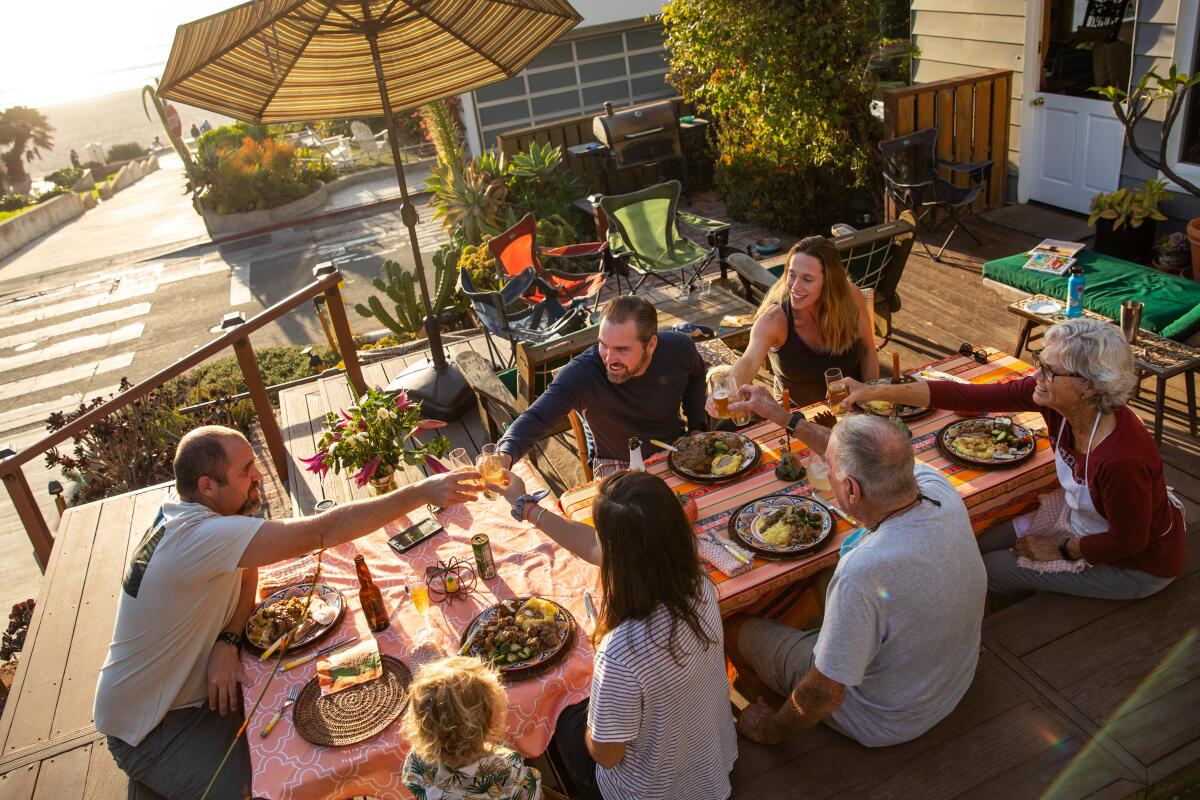Editorial: Are Americans the Thanksgiving dinner guests, or the hosts? Both, of course

Thanksgiving celebrations are often homecomings, with the grown-up kids returning to the nest with their own children in tow, for dinner or the whole long weekend. Or maybe a cousin’s house or a close friend’s is designated as headquarters for the ritual feast and as home base from which Black Friday excursions are planned and college football games are enjoyed. So who is the host and who is the guest? There’s not always a clear line.
If it’s your house, you’re pretty sure you’re the host. But then, what if an older sibling is bringing the turkey, the stuffing and everything else, and will do the carving? That may change the politics of the whole affair. And family politics can be as contentious as any other kind of struggle over power and prestige, because the roles of host and guest each bring their own traditions, expectations and obligations.
The good guest brings a small gift or treat as a token of gratitude. The good host provides nourishment, and offers a bed for the night in case the weather turns hazardous. The host does not turn away the guest. The guest follows the host’s code of conduct. The particulars change but the laws of hospitality are ancient and sacred, whether for family or strangers.
Who were the hosts at the three-day autumn harvest feast in Plymouth Plantation in the fall of 1621, and who were the guests? Who felt what obligation, and to whom?
We have very little information about what we’ve come to consider the first Thanksgiving. We know only that one colonist, Edward Winslow, reported that a team of four Pilgrims came back from a hunt with enough birds to feed the settlement for a week, and that Massasoit, leader of the Wampanoag confederation, joined them along with “some ninety of his men” and added five deer to the menu.
The tale many of us learned in elementary school is one of mutual respect and friendship. Squanto, a Patuxet man living in the Wampanoag confederation, served as a translator and taught the Pilgrims how to grow corn and other crops. The first harvest was abundant, and the Pilgrims and Wampanoag celebrated together.
The adult version adds some essential details. Tisquantum (Squanto) could speak English only because English raiders had kidnapped him and sold him into slavery in Europe. When he returned to his homeland, he discovered that every other Patuxet had died of a presumably English plague, perhaps smallpox. Indeed, the only reason the Pilgrims could settle, farm and build where they did was that the disease had left the Patuxet land vacant.
So who was the host that first Thanksgiving? The Pilgrims surely believed they were, having built their homes and raised their crops on what they deemed vacant land, sharing their own food in their own settlement, with the visiting Wampanoag.
The Wampanoag would have scoffed at the suggestion that these wretched foreigners from another continent, who had made such poor plans and who surely would all have died without Wampanoag aid that first winter and spring, were hosts at this celebration on land that was so clearly not theirs.
The Wampanoag today say that the Pilgrims did not even invite them to the feast. As reported in the Washington Post, they say the celebrating immigrants fired off their guns, and that the alarmed Wampanoag showed up expecting war, but stayed for dinner.
As the years passed, more English kept coming, bringing more disease, taking more land. Massasoit’s son, Metacomet, realized too late that the colonists meant to supplant his people, and he went to war against them. The colonists, victorious, killed Metacomet and mounted his head at Plymouth, the site where his father and the Pilgrims shared the first Thanksgiving feast a half-century earlier.
Today the Wampanoag, understandably, do not celebrate Thanksgiving, but instead designate the fourth Thursday in November as a National Day of Mourning.
It has been 400 years since the first Thanksgiving and we’ve come to laud ourselves as gracious hosts who offer shelter to exiles, outcasts and pilgrims. Somewhere in the back of our collective psyche, though, must be a warning against opening our doors to any of those folks, because they could turn out to be exactly what our societal forebears were — the guests from hell. We may share a feast with strangers, and then imagine them mounting our heads over our own dinner table.
But this is America. We contend with one another for the privilege of being host (and the right to lay down the rules of the house) and the honor of being guest (and the right to expect shelter and sustenance). We’re both host and guest at the same time. And neither. We’re family — squabbling and obnoxious, but maybe also open and (dare we say it) loving, as long as there is enough stuffing to go around.
And there is. For us, and even for unexpected guests, if we remember to pass the plate after serving ourselves.
More to Read
A cure for the common opinion
Get thought-provoking perspectives with our weekly newsletter.
You may occasionally receive promotional content from the Los Angeles Times.










